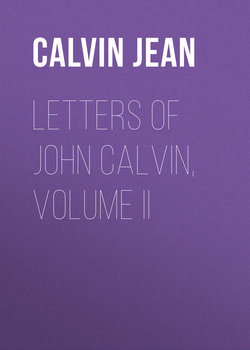Читать книгу Letters of John Calvin, Volume II - Calvin Jean, Jean Calvin - Страница 31
CLXXIV. – To Farel
ОглавлениеCalvin's indisposition – literary labours – apparent reconciliation with Perrin and his family
Geneva, 2d October 1546.
Not to beguile you by a vain hope, I may say that I do not think I shall come to your place before winter; for having once experienced the inconvenience of a voyage, I shall not venture again to commit myself to the waters. A good part of the journey would thus fall to be accomplished on foot, for the jolting of a horse is not only hurtful to me, but the rubbing also is dangerous. I am not acquainted with the physician of whom you speak, nor do I rightly understand what druggist you blame, unless, as I conjecture, you hint at Francis. What Textor may now think I do not know, except that he was too stringent in his prescriptions. For by involving himself in the lawsuits of his father, he has woven, in his native place, a Penelope's web that will have no end. Meanwhile, you see him complaining that he was deprived of my advice. But this peevishness of the good man must somehow or other be tolerated by us. As you exhort me to write, I wish I had more leisure occasionally, and more robust health. I have now, however, set myself in earnest to the Epistle to the Galatians.76 I am not free in the matter of publication, as far at least as the Epistles of Paul are concerned. You once heard from me when I was at Strasbourg, that Wendelin laid me under obligations by services of such a nature, that I should be constrained to charge myself with ingratitude unless I offered this work to him. For at the time of my greatest straits, he expended on my behalf above forty golden pieces, and he was not less prompt in his assistance in taking charge of my domestic affairs, than if I had hired him for the express purpose of superintending them. I am, therefore, now not at liberty to refuse him the Epistles. If I should write anything else, it will rather be published here, and yet Des Gallars could find no one to undertake to bring out two short treatises he had composed. Before, however, I subject my writings to any risk, I shall retain a copy. I left off for a time a short treatise, De Scandalis,77 that I had begun, because the style did not flow so freely as I wished, nor have I a mind to resume it, until I shall have completed the Commentary on the Epistle to the Galatians. I had lately some conversation with our friend Perrin. If he perform what he promised, matters will not be at the very worst.78 Penthesilæa, while in her outward deportment she affects a wonderful friendship, rages within doors in a terrible manner. I observe that you have written to her. I shall call for her on the earliest opportunity. I shall then discover what effect your letter has had. – Adieu, brother and most sincere friend. May the Lord be ever present with you, always protect you, and render your labours prosperous! I wrote to the ministers of Berne. If you desire to know the contents of the letter Viret, I think, retained a copy. My wife reverently salutes you, as also Des Gallars, Feron, my brother, (for since I received yours I have not seen the others.) The best greeting to the brethren and friends, and to your whole family. – Yours,
John Calvin.
I had no talk with Perrin about your letter. I was unwilling to touch that sore, until it should have been somewhat mollified by the lapse of time. If there is any news, provided it be certain, let us immediately know, I pray you.
[Lat. orig. autogr. – Library of Geneva. Vol. 106.]
76
The Commentaries on the four Epistles of St. Paul to the Galatians, the Ephesians, the Philippians, and the Colossians, were not published until 1548, by the bookseller Girard, of Geneva. Is there a previous edition of the Commentary on the Galatians? We are not aware of any.
77
This, one of the most remarkable of the works of Calvin, appeared only in 1550.
78
This apparent reconciliation was without satisfactory result. Perrin could not tolerate, nor Calvin sacrifice, the right of censure vested in the Consistory, and which the excesses of the Libertins daily rendered more necessary. "Complaints to the Council by M. Calvin regarding the dissoluteness of the youth, there being nothing more common in the city than acts of debauchery and licentiousness." – Registers of Council, 11th October 1546.
